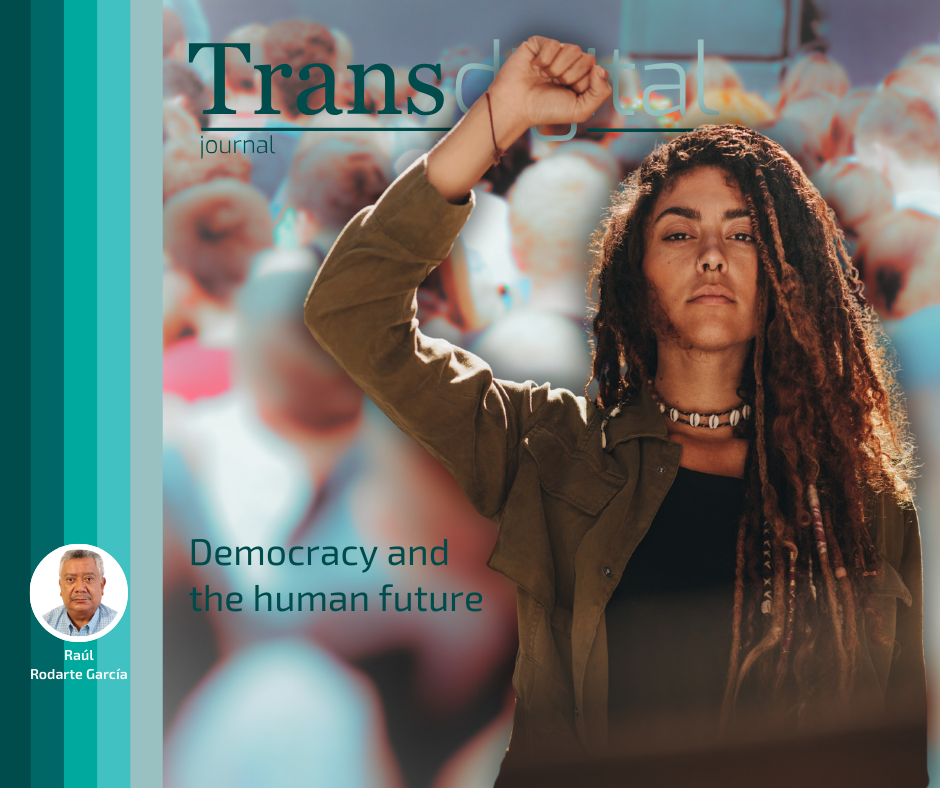Democracy and the human future
DOI:
https://doi.org/10.56162/transdigital302Keywords:
ethics, society, history, community, human socialismAbstract
When analyzing human history from a moral point of view, it is clear that the accumulation of power and wealth is the generator of the current great social crisis; that is the focus that generates other crises that overwhelm humanity today. The different economic systems reflect the taking of political, social and economic control by a minority, under the premise of being the protectors of the social order. But neoliberalism has shown that these minorities are only interested in money and, to do so, they have dedicated themselves to the plundering of human wealth. It is necessary to return to the assessment of good and bad, goodness and evil, and the appropriation of moral discourse, which until now has served to justify all those actions that go against human development and that perpetuate social differences. At the same time, ethics and politics, which can humanize society, have been pushed aside by economic power as a way to control economic minorities. But within societies, large contingents of people have created the foundations of different societies that seek to establish human ties that allow the existence of a future of peace and justice. That is to say, in the human future there is the decision to revalue the good, the goodness and eliminate the traces of the social relations of dispossession.
References
Alpha History. (2024). Eisenhower explica la teoría del dominó. Página web official de alpha history. https://es.alphahistory.com/guerra-Fr%C3%ADa/eisenhower-explica-la-teor%C3%ADa-del-domin%C3%B3-1954/
Arendt, H. (2005). La condición humana. Ediciones Paidós.
Boltvinik, J. (2023, 16 de junio). Economía moral. Edward O. Wilson y el debate sobre la naturaleza humana. Página web oficial de Filosofia.mx. Sitio de America Latina dedicado a la filosofía, la crítica y el debate. https://www.filosofia.mx/economia-moral-edward-o-wilson-y-el-debate-sobre-la-naturaleza-humana-v-por-julio-boltvinik/
Brooks, D. (2023a, 22 de mayo). American curios, Obra abstracta. La Jornada. https://www.jornada.com.mx/2023/05/22/opinion/025o1mun
Brooks, D. (2023b, 29 de mayo). American curios, Fácil y duro. La Jornada. https://www.jornada.com.mx/noticia/2023/05/29/mundo/american-curios-facil-y-duro-5581
Brooks, D. & Cason. J. (2023a, 20 de abril). Uno de cada 6 estadunidenses ha estado en un tiroteo: sondeo. La Jornada. https://www.jornada.com.mx/2023/04/20/mundo/024n1mun
Brooks, D. & Cason, J. (2023b, 6 de junio). El filósofo Cornel West anuncia candidatura independiente en EU. La Jornada. https://www.jornada.com.mx/2023/06/06/mundo/021n1mun
Byung-Chul, H. (2016). Sobre el poder. Editorial Herder.
Ciro, E. (2023). El tríptico sicoactivo en la era del capital: los dormidos y la crisis de los opioides. La Jornada. https://www.jornada.com.mx/2023/03/20/opinion/017a1pol
Dieterich, H., Dussel, E., Franco-Arno, R., Carsten, P., & Zemelman, S.-H. (1999). Fin del Capitalismo Global. El Nuevo Proyecto Histórico. Editorial Txalaparta.
Enciso, A. (2023a, 24 de abril). Hay incertidumbre en el mundo frente a la "mundialización" del poder: experto. La Jornada. https://www.jornada.com.mx/notas/2023/04/24/cultura/hay-incertidumbre-en-el-mundo-frente-a-la-mundializacion-del-poder-experto/?from=homeonline&block=ultimasnoticias
Enciso, A. (2023b, 25 de abril). Hay crisis universal de la democracia, afirma Edgar Morin. La Jornada. https://www.jornada.com.mx/2023/04/25/politica/010n2pol
Engels, F. (2006). El origen de la familia, la propiedad privada y el Estado. Fundación Federico Engels. https://www.fundacionfedericoengels.net/images/PDF/engels_origen_familia_interior_alta.pdf
González Casanova, P. (2000). Comunidad: la dialéctica del espacio. Conceptos y fenómenos fundamentales de nuestro tiempo. Universidad Nacional Autónoma de México. https://conceptos.sociales.unam.mx/conceptos_final/414trabajo.pdf
Lewis, C. S. (1990). El problema del dolor (6ª. ed.). Editorial Universitaria.
Luhmann, N. (2005). Poder. Anthropos Editorial.
Montoya, V. (2006). Teorías de la Violencia Humana. Revista Razón y Palabra, 53. http://www.razonypalabra.org.mx/anteriores/n53/vmontoya.html
Morin, E. (1999). Los siete saberes, necesarios para la educación del futuro. Editorial Santillana – UNESCO.
Parejo Rendón, C. (2023). La crisis europea y el extravío en el mundo multipolar: ¿un papel demasiado confuso? Página web oficial de Russia Today. https://actualidad.rt.com/opinion/carmen-parejo/461617-crisis-europea-mundo-multipolar
Quintanar, H. A. (2023). ¿Por qué hay neonazis en México? La Jornada. https://www.jornada.com.mx/2023/02/21/opinion/014a1pol
Romanos Fraile, E. (2007). Memoria e historia de la clandestinidad libertaria bajo el franquismo. Estado de la cuestión y perspectivas. En P. Rújula & I. Peiró (eds.), La Historia en el Presente (pp. 339-362). Instituto de Estudios Turolenses.
Saxe-Fernández, J. (2023) Sanciones: debacle capitalista. La Jornada. https://www.jornada.com.mx/2023/05/18/opinion/020a1eco
Spector, H. (1995). Propiedad privada y neutralidad estatal. Doxa. Cuadernos de Filosofía del Derecho, (17-18), 189–229. https://doi.org/10.14198/DOXA1995.17-18.08
Yasinsky, O. Buscando futuro (I): el guía interno. Página web oficial de Russia Today. https://actualidad.rt.com/opinion/oleg-yasinsky/469936-buscando-futuro-guia-interno
Zibechi, R. (2023). Democracia y manipulación de la opinión pública. La Jornada. https://www.jornada.com.mx/2023/02/24/opinion/017a1pol

Downloads
Autor de correspondencia
El autor de correspodencia se identifica con el siguiente símbolo: *Published
How to Cite
License
Copyright (c) 2024 Raúl Rodarte García

This work is licensed under a Creative Commons Attribution 4.0 International License.
All articles in Transdigital are licensed under a Creative Commons Attribution 4.0 International License. Authors hold the copyright and retain publishing rights without restrictions.









